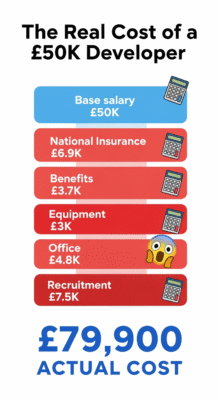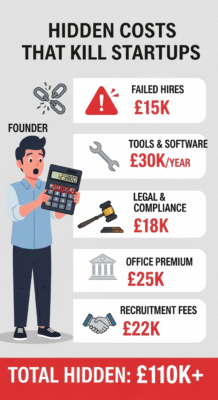Remember when you thought building your startup would cost £50K? Yeah, me too.
Here’s the reality check most UK founders get after their first developer quote: that “simple” app you sketched on a napkin? It’s going to cost more than your car. And that’s just the beginning.
I’ve seen too many brilliant startup ideas die because founders underestimated development costs by 50-70%. Let’s fix that. Here’s exactly what it costs to build a startup in the UK in 2025 – no sugar-coating, no hidden surprises.
The Brutal Truth About UK Development Costs
Let’s start with what everyone gets wrong: salary isn’t the real cost.
When you hire a £50K developer, you’re actually paying closer to £70K once you add everything up. Here’s the breakdown that’ll make your accountant cry:
What a £50K Developer Actually Costs You:
- Base Salary: £50,000 (the bit everyone focuses on)
- National Insurance: £6,900 (employer’s contribution)
- Pension Contributions: £1,500 (minimum 3%)
- Holiday Pay: £4,200 (25 days + bank holidays)
- Sick Pay & Benefits: £2,000
- Equipment & Software: £3,000 (laptop, licenses, monitors)
- Office Space: £4,800 (£400/month in most UK cities)
- Recruitment Costs: £7,500 (15% of salary if using agencies)
Real Annual Cost: £79,900

And that’s before they’ve written a single line of code.
Building Your Minimum Team
Most startups need at least these people to build something decent:
The “Bare Minimum” Team:
- 1 Senior Developer: £79,900
- 1 Junior Developer: £45,300 (£30K salary + extras)
- 1 Designer: £58,400 (£40K salary + extras)
Total: £183,600 per year
The “We Actually Want to Launch” Team:
- 1 Tech Lead: £94,900
- 2 Mid-Level Developers: £139,800 (£70K each)
- 1 Frontend Specialist: £79,900
- 1 Designer: £58,400
Total: £373,000 per year
Feeling dizzy yet? It gets worse.
The Costs Nobody Warns You About
Here’s where most startups get blindsided:
The “Oh Shit” Expenses
Failed Hires:
Remember that developer who seemed perfect in the interview but couldn’t code their way out of a paper bag? That’ll cost you £15K in wasted salary, plus another £7K to find their replacement.
The Tools Tax:
- GitHub, AWS, Figma, Slack, Jira, monitoring tools…
- Budget £500-800 per developer per month
- For a 5-person team: £30K annually
Legal Stuff (Because GDPR is Real):
- Data protection compliance: £5K
- Terms & conditions: £3K
- Employment contracts: £2K per person
- IP protection: £8K
The London Premium:
If you’re in London, add 30-40% to everything. That £400/month office space? Try £700. That £50K developer? They want £65K.
The Remote Alternative (That Actually Works)
Here’s where smart founders are saving their startups:
Same Team, Different Geography
Remote MVP Team:
- Senior Developer (Sri Lanka): £28,000
- Frontend Developer (Poland): £32,000
- Designer (Philippines): £18,000
- Project Manager: £4,000
Total: £82,000 (vs £183,600 UK)
Savings: £101,600 (55% less)
Real Founder Story
“I was quoted £240K for my fintech MVP by a London agency. Through TalentsBridge, I built it for £85K with a team that was actually better than the local options. The money I saved kept us alive for an extra 18 months – long enough to get our Series A.”
– Marcus Thompson, Founder of PayFlow
What It Actually Costs to Build Different Types of Startups
Simple SaaS Tool (think project management app)
- UK Team: £120K – £200K
- Remote Team: £45K – £75K
- Timeline: 4-8 months
Mobile App (iOS + Android)
- UK Team: £150K – £300K
- Remote Team: £55K – £110K
- Timeline: 6-12 months
Marketplace Platform (think Airbnb for X)
- UK Team: £300K – £600K
- Remote Team: £120K – £240K
- Timeline: 8-18 months
Fintech/Complex Platform
- UK Team: £500K – £1M+
- Remote Team: £200K – £400K
- Timeline: 12-24 months

Your Startup Budget Planning Roadmap
Phase 1: Prove It Works (Months 1-4)
What you’re building: Basic MVP with core features only
Budget: 30% of total development budget
- UK Route: £80K – £120K
- Remote Route: £30K – £50K
Phase 2: Make It Good (Months 5-8)
What you’re building: Polish the UX, add essential features
Budget: 40% of total development budget
- UK Route: £120K – £180K
- Remote Route: £50K – £80K
Phase 3: Scale It Up (Months 9+)
What you’re building: Advanced features, optimization, scaling
Budget: 30% of total development budget
- UK Route: £100K – £150K
- Remote Route: £40K – £70K
How TalentsBridge Saves Your Startup
Look, I get it. You’re worried about quality, communication, time zones. Every founder is.
Here’s what we, TalentsBridge actually do:
- Pre-screen everything: Only 2% of developers make it through our process
- Handle the boring stuff: Contracts, payments, compliance – all sorted
- UK-based support: You get a project manager who speaks fluent British sarcasm
- Risk-free trial: 30 days to make sure they’re brilliant
The result? You get world-class developers for 60% less, and you can focus on building your business instead of managing contractors.
FAQ Section
Q: How much should I budget for my startup’s MVP development?
A: Based on 2025 UK market data, budget £100K-£180K for in-house development or £35K-£65K for remote teams. Always add 25% contingency – scope creep is real, and you’ll want features you didn’t think of initially. Most successful startups spend 6-12 months of runway on their MVP.
Q: What’s the biggest budgeting mistake UK startups make?
A: Underestimating the true cost of employment. According to UK employment data, the actual cost is 140-160% of the stated salary when you include NI, benefits, equipment, office space, and recruitment. A £50K developer actually costs £70-80K annually.
Q: How do I know if remote development is right for my startup?
A: Remote works best if you’re budget-conscious (under £200K development budget), can work with 4-6 hour timezone overlaps, and prioritize cost efficiency over daily face-to-face interaction. 73% of UK startups now use remote developers for cost savings and access to global talent.
Q: When should I hire my first in-house developer vs continuing with remote?
A: Consider in-house when you’ve achieved product-market fit, have consistent revenue (£50K+ MRR), and need someone for strategic decisions rather than just coding. Most successful startups stay remote until Series A funding, then hire 1-2 key in-house people while keeping remote teams for execution.
Q: How do I avoid scope creep destroying my budget?
A: Define your MVP ruthlessly – aim for 3-5 core features maximum. Use fixed-price contracts for defined phases rather than hourly rates. Set up weekly budget reviews and have a “feature parking lot” for ideas that come up during development. Budget 20-25% contingency for essential changes only.



